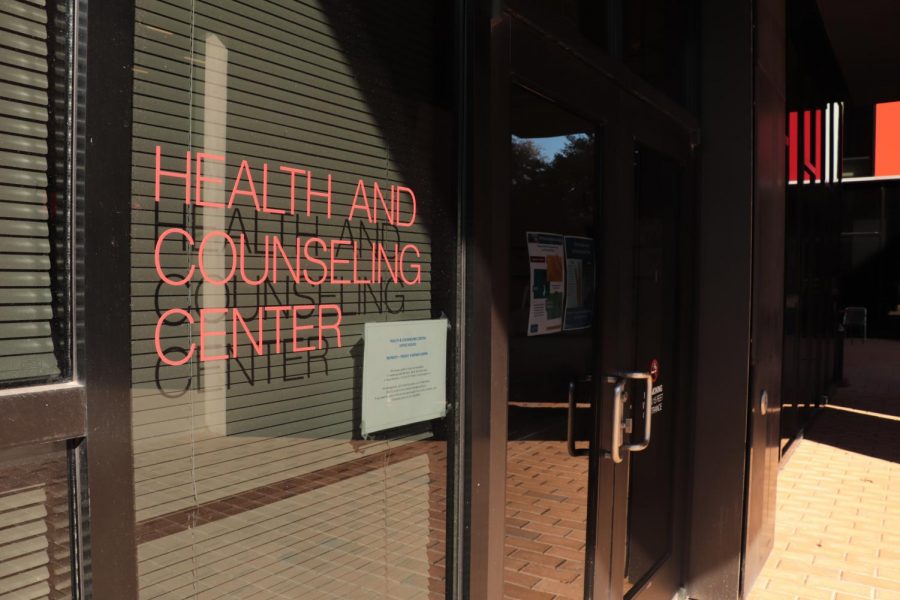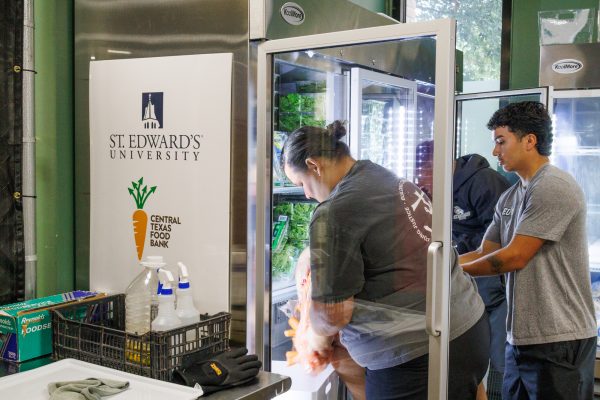Q&A: Breaking down services offered by the Health and Counseling Center with on-campus clinicians
The HCC operates Monday through Friday from 8 a.m. until 5 p.m. with emergency hotlines available 24/7.
Mental health struggles can be a constant factor in student life here at St. Edward’s. The university and student organizations, like the Transgender Wellness Organization, are some of the many resources offered on campus for students dealing with mental health issues, like depression, anxiety, panic disorders, PTSD and gender dysphoria.
The largest organization on campus that offers a variety of mental health and other health services is the Health and Counseling Center in the Village. The HCC offers resources beyond in-person visits, like access to a 24/7, year-round helpline and workshops where students can receive more information on solutions.
The HCC has many plans to increase engagement with students in the years to come, with a focus on making sure students feel comfortable enough to open up about their mental health issues and take an initiative toward finding solutions.
Hilltop Views sat down with Clinical Case Manager Andrea Cervantes, Staff Psychologist and Group Coordinator Micheal Hershberger, and Director of Counseling Services Molly Wang to discuss ways the HCC has adapted as an organization since COVID-19 to better approach student mental health and its effects, plans for future initiatives and services students might not know they have access to.
Mental health resources
Cervantes spoke on the mental health services the HCC offers in person for university students. She also explained what one might expect when they become involved in counseling sessions with HCC clinicians and what the referral process entails.
Q: Can you go into detail about specific counseling services that students have available for them here on campus?
A: Basically, we work with students that come to us for all kinds of mental health reasons. It could vary from depression, anxiety or more concerning symptoms as well. Mostly what we do is what we call “short-term therapy,” which means that we create goals with students that can be achievable within a handful of sessions. Often, that’s around maybe five to seven sessions — sometimes it’s a little bit more, sometimes it’s a little bit less. It kind of depends on the student’s needs. What our goal is, is to get a student to a place where they feel empowered and confident to take care of their own mental health using coping skills (and) support systems.
Q: So after those five to seven sessions, if a student is still feeling like they need more, what would happen?
A: Anything that feels like it needs more long-term services is when they would come to me to get referrals for off-campus services. If we’re going to refer off campus, we usually go through the student’s insurance plan. If for some reason they have insurance that limits their accessibility to mental health services, often we continue seeing them beyond the seven sessions so that they can still be provided services, regardless of their insurance or financial status. If they do have an insurance or financial situation that allows them to receive quality services outside of campus, that is when they would come to me for case management services.
Q: A lot of students may feel embarrassed or nervous to approach the counseling center. So if you could say anything to those students who may be feeling that way, what would you say?
A: We get that a lot, because there’s such a negative stigma about mental health in general. And what I usually tell students is, “If this wasn’t a common issue, especially among this age population, there wouldn’t be counseling centers on college campuses.” So since that exists, that goes to show how normal and natural it is for these things to be coming up for people in this age range (and) in this developmental stage. Being a young adult in college can be really difficult, as you are discovering yourself, discovering who you want to be in the future, discovering the type of people you want in your life. Finding independence for the first time can be really overwhelming. And although there’s that negative stigma, it is completely normal and natural for those things to come up.
The importance of a counseling presence
Wong dived into services the HCC has outside of one-on-one counseling — like the Hilltopper Helpline — and what the HCC’s goal is as a student resource on campus.
Q: What other types of services and resources does the HCC have to offer for students struggling with mental health issues that are more immediate?
A: We offer support groups as well as same-day crisis support. So if a student is in crisis, whether it’s because they are straight up experiencing extreme anxiety from something like test anxiety or the recent loss of a loved one. Sometimes it’s a student who is experiencing the first signs and symptoms of a mental illness, such as bipolar disorder or schizophrenia, where they’re experiencing psychosis. A counselor is available Monday through Friday, eight to five, to provide same-day crisis support for students in crisis.
Q: How might a student who is in need of immediate assistance get help when the HCC is not open?
A: The Hilltopper Helpline is a partnership that we have with an external provider. They provide in-the-moment phone counseling support, so students in crisis outside of our business hours can certainly call them. (It’s) most appropriate, though, for students who are not necessarily in crisis, but need in-the-moment support. Maybe they have recently encountered a really tough situation and they just want to talk to a counselor to process some of their thoughts and feelings. Maybe it’s something that happens on the weekend. And so this is a provider that we contract with, and they’re available 24/7; 365 days a year; even on Christmas Eve. The staff are clinicians with at least three years of experience, so the students are not going to be talking to a brand new counselor; they’re going to be talking to someone with more experience.
Q: In your own, personal opinion, why do you believe having health and counseling services on college campuses is so important?
A: College is a stressful time. It’s a transitory time. Whenever we have transitions in life, it’s going to bring up feelings, thoughts; it’s going to bring up stress, which isn’t necessarily bad, but college counseling centers and the HCC can provide students with the tools they need to manage (and) navigate those stressors. Students who maybe didn’t have an opportunity to pick up some coping skills when they were younger can do that at the Health and Counseling Center. Another fantastic thing that maybe not all students know about is that all of these services are free. As long as they’re a student at St. Edward’s, all of these services are free. There’s no copay — at least not on the counseling side. We want students to take advantage of this because it’s available to them.
Coming out of the pandemic haze
Having been with the HCC for more than four years, Dr. Hershberger noted several differences between service engagement now compared to before COVID-19. Not only have mental illness rates in students increased, but community outreach has become more difficult to maintain in a post-COVID campus. He also offers insight to what the HCC has in store for upcoming semesters.
Q: What differences have you seen in Health and Counseling Services at St. Edward’s since the pandemic?
A: I got here right before COVID, and as a group coordinator, we were able to start up a lot of groups and things like that. It went really well that first year, then COVID hit. Everybody went home and everything went virtual. Our groups and our workshops really did take a participation hit.
During that year of COVID, when all the students were back at home, we tried to provide workshops. We tried to provide support groups and all those things virtually. However, I think (students) were out of sight out of mind as far as it came to school. As COVID continued and students started to come back, we have found that other departments on campus have also found student participation has been a challenge to get students to be re-engaged, which makes perfect sense. If you think about it, during the entire COVID times, we were all taught to stay at home (and) avoid people; avoid interacting with people or somebody could potentially die, like, for real. So, there’s a big hesitation for individuals, students, adults, faculty and staff to engage with other people in larger groups. Because of that, it’s been hard to get more group participation in host workshops. Not only in our department, but departments across campus. One of the biggest changes is (the) struggle to get participation as a whole with students.
Q: What sort of plans does the HCC have set for the future in order to help combat engagement issues?
A: We’re trying everything that we can think of. We’re trying to do a little bit more with the advertising, but really, it’s about what we’re going to try moving forward in presenting all of our options at the beginning of the semester; leaving it wide open; encouraging other ways to get the words out there, whether it be posters and flyers and social media; partnering with other campus partners as well to encourage them to encourage their students to come out.
One of the main things that we’re doing specifically is (that) we’ve been working with various different student groups as well as different academic and various business offices on campus, whether it be academic support, success coaches in the career center, disability services and the Dean of Students. We work with a lot of those departments and let them know about the resources we have (and) how they can refer students to us. We also host some workshops with faculty and staff to help them ask us questions as far as we have students struggling with these issues. We work and we have been increasing working hand in hand with faculty and staff and various departments to help them work with students in more effective and supportive ways (and) recognizing when it’s useful to hand it off to the trained professionals at the HCC, where we can make sure the students get the help that they need.
For more resources and information, visit the HCC’s website or stop by during business hours.

Claire is a senior Communication major with a minor in Journalism continuing to dedicate her time growing and learning as a student journalist. Claire...











